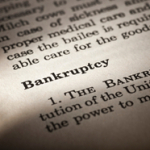 As 2016 comes to an end, the 2017 Tax Season will begin. Federal law requires that all employers provide their employees with their W2s no later than January 31st, so that federal income taxes may be filed by April 18th. Bankrate predicted in 2015 that thirty percent of the public who would receive a 2014 tax refund would use that refund to assist them with lowering their debt and that many of this thirty percent would use their tax refund to file a Chapter 7 or Chapter 13 Bankruptcy. This statistic has remained unchanged for many years.
As 2016 comes to an end, the 2017 Tax Season will begin. Federal law requires that all employers provide their employees with their W2s no later than January 31st, so that federal income taxes may be filed by April 18th. Bankrate predicted in 2015 that thirty percent of the public who would receive a 2014 tax refund would use that refund to assist them with lowering their debt and that many of this thirty percent would use their tax refund to file a Chapter 7 or Chapter 13 Bankruptcy. This statistic has remained unchanged for many years.
The most advantageous benefit to using your tax return to help you file a Chapter 7 or Chapter 13 Bankruptcy is that using your tax refund to fund your bankruptcy allows you to use your refund in an essential and reasonable manner. When you use your tax refund in an essential and reasonable manner such as filing bankruptcy, then your tax refund most likely will be protected from your creditors and well spent. Continue reading →








